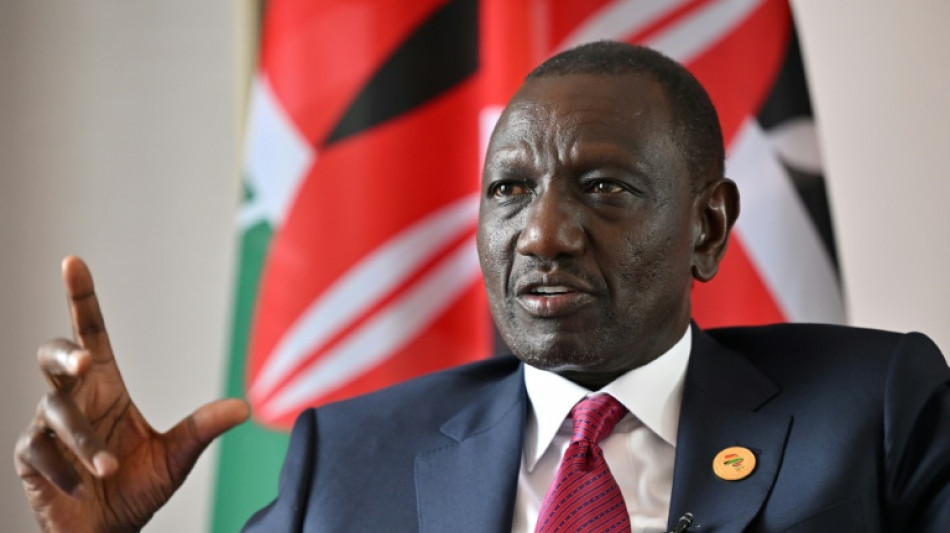
-
 Munsey leads Scotland to 207-4 against Italy at T20 World Cup
Munsey leads Scotland to 207-4 against Italy at T20 World Cup
-
Japan restarts world's biggest nuclear plant again

-
 Bangladesh poll rivals rally on final day of campaign
Bangladesh poll rivals rally on final day of campaign
-
Third impeachment case filed against Philippine VP Duterte

-
 Wallaby winger Nawaqanitawase heads to Japan
Wallaby winger Nawaqanitawase heads to Japan
-
Thailand's Anutin rides wave of nationalism to election victory

-
 Venezuela's Machado says ally kidnapped by armed men after his release
Venezuela's Machado says ally kidnapped by armed men after his release
-
Maye longs for do-over as record Super Bowl bid ends in misery

-
 Seahawks' Walker rushes to Super Bowl MVP honors
Seahawks' Walker rushes to Super Bowl MVP honors
-
Darnold basks in 'special journey' to Super Bowl glory

-
 Japan's Takaichi may struggle to soothe voters and markets
Japan's Takaichi may struggle to soothe voters and markets
-
Seahawks soar to Super Bowl win over Patriots

-
 'Want to go home': Indonesian crew abandoned off Africa demand wages
'Want to go home': Indonesian crew abandoned off Africa demand wages
-
Asian stocks track Wall St rally as Tokyo hits record on Takaichi win

-
 Bad Bunny celebrates Puerto Rico in joyous Super Bowl halftime show
Bad Bunny celebrates Puerto Rico in joyous Super Bowl halftime show
-
Three prominent opposition figures released in Venezuela

-
 Israeli president says 'we shall overcome this evil' at Bondi Beach
Israeli president says 'we shall overcome this evil' at Bondi Beach
-
'Flood' of disinformation ahead of Bangladesh election

-
 Arguments to begin in key US social media addiction trial
Arguments to begin in key US social media addiction trial
-
Agronomics Limited Announces Net Asset Value Calculation as at 31 December 2025

-
 UK-Based Vesalic Limited Emerges from Stealth with Landmark Discovery of Potential Non-CNS Driver of Motor Neuron Diseases, including ALS, and Breakthrough Therapeutic and Diagnostic Opportunities
UK-Based Vesalic Limited Emerges from Stealth with Landmark Discovery of Potential Non-CNS Driver of Motor Neuron Diseases, including ALS, and Breakthrough Therapeutic and Diagnostic Opportunities
-
Gotterup tops Matsuyama in playoff to win Phoenix Open

-
 New Zealand's Christchurch mosque killer appeals conviction
New Zealand's Christchurch mosque killer appeals conviction
-
Leonard's 41 leads Clippers over T-Wolves, Knicks cruise

-
 Trump says China's Xi to visit US 'toward the end of the year'
Trump says China's Xi to visit US 'toward the end of the year'
-
Real Madrid edge Valencia to stay on Barca's tail, Atletico slump

-
 Malinin keeps USA golden in Olympic figure skating team event
Malinin keeps USA golden in Olympic figure skating team event
-
Lebanon building collapse toll rises to 9: civil defence

-
 Real Madrid keep pressure on Barca with tight win at Valencia
Real Madrid keep pressure on Barca with tight win at Valencia
-
PSG trounce Marseille to move back top of Ligue 1

-
 Hong Kong to sentence media mogul Jimmy Lai in national security trial
Hong Kong to sentence media mogul Jimmy Lai in national security trial
-
Lillard will try to match record with third NBA 3-Point title

-
 Vonn breaks leg as crashes out in brutal end to Olympic dream
Vonn breaks leg as crashes out in brutal end to Olympic dream
-
Malinin enters the fray as Japan lead USA in Olympics team skating

-
 Thailand's Anutin readies for coalition talks after election win
Thailand's Anutin readies for coalition talks after election win
-
Fans arrive for Patriots-Seahawks Super Bowl as politics swirl

-
 'Send Help' repeats as N.America box office champ
'Send Help' repeats as N.America box office champ
-
Japan close gap on USA in Winter Olympics team skating event

-
 Liverpool improvement not reflected in results, says Slot
Liverpool improvement not reflected in results, says Slot
-
Japan PM Takaichi basks in election triumph

-
 Machado's close ally released in Venezuela
Machado's close ally released in Venezuela
-
Dimarco helps Inter to eight-point lead in Serie A

-
 Man City 'needed' to beat Liverpool to keep title race alive: Silva
Man City 'needed' to beat Liverpool to keep title race alive: Silva
-
Czech snowboarder Maderova lands shock Olympic parallel giant slalom win

-
 Man City fight back to end Anfield hoodoo and reel in Arsenal
Man City fight back to end Anfield hoodoo and reel in Arsenal
-
Diaz treble helps Bayern crush Hoffenheim and go six clear

-
 US astronaut to take her 3-year-old's cuddly rabbit into space
US astronaut to take her 3-year-old's cuddly rabbit into space
-
Israeli president to honour Bondi Beach attack victims on Australia visit

-
 Apologetic Turkish center Sengun replaces Shai as NBA All-Star
Apologetic Turkish center Sengun replaces Shai as NBA All-Star
-
Romania, Argentina leaders invited to Trump 'Board of Peace' meeting


Africa could help 'decarbonise' global economy, Kenyan president tells AFP
Kenyan President William Ruto told AFP on Wednesday that Africa could help decarbonise the global economy -- but developed countries need to step up with serious investment to help unlock the continent's potential.
In Seoul for a major summit this week, where South Korea committed $24 billion in aid and investment support to Africa, Ruto urged wealthy countries to do more: from better financing to technology transfers to funding clean energy transitions.
"We are seeing the effects of climate change everywhere," he told AFP, pointing to Kenya's recent experience of swinging from extreme drought to devastating floods.
Africa wants "to be part of the solution" but is being left out of some climate efforts, he said, referring to recent historic levels of investment in renewable energy, of which just a fraction has been directed to Africa.
"There is need for greater investment in the continent of Africa to unlock African potential -- not necessarily to benefit Africa alone," he said.
"We can use the renewable energy assets we have, the mineral resources we have, the human capital we have in our African continent, to decarbonise not just our production and consumption, but global consumption and global production," he said.
This requires "international financial architecture that gives countries that suffer the most and yet have contributed the least the best possible chance to be resilient, to adapt," he said.
"And that's why we've been pushing the international financial architecture to be much more agile, much more flexible, and to provide resources for countries in the developing world, especially in Africa... because at the moment, we are paying close to five or six or seven times more than our counterparts elsewhere."
- Climate cash -
One of the major topics of conversation at the Korea-Africa summit was, he said, Seoul providing more funding "so that more countries can have resources for mitigation, for adaptation, and for managing effects of climate change."
In 2009, developed nations promised to mobilise $100 billion a year by 2020 to help low-income countries invest in clean energy and cope with the worsening effects of climate change.
They met that target for the first time in 2022, two years later than promised, the OECD said last week.
Ruto said that "$100 billion is a step in the right direction," but added that far more was needed.
Experts agree that the $100 billion target is nowhere near what developing nations will need for renewable energy and adaptation measures like coastal defences against rising seas.
A panel convened by the UN estimates these countries -- excluding China -- will need $2.4 trillion a year by 2030 to meet their climate and development needs.
Climate finance is a thorny issue at the annual UN climate talks and negotiators have been working this year to try and set a new goal to supersede the $100 billion target.
The hosts of this year's COP29 in gas-rich Azerbaijan have made the matter a priority and hope to have an ambitious agreement inked during the summit in November.
- Mitigate impacts -
Earlier this year, Kenya was battered by unusually heavy rainfall, causing a trail of destruction and swamping entire villages.
The torrential rains, amplified by the El Nino weather pattern, have killed around 300 people in flood-related disasters since March, according to government data.
Ruto said that Kenya was working across the board to try and make the country more resilient to extreme weather.
"We are moving our tree cover from 10 percent to 30 percent," he said, saying the country would plant 15 billion trees as part of a program to restore wetlands and other fragile, degraded ecosystems.
Ruto has been criticised for last year lifting a six-year ban on logging in state forests, but he said it was important that Kenya balance its needs for commercial forestry and ecosystem conservation.
Kenya's forests are also key to the growing area of carbon markets, with the country accounting for some 25 percent of the carbon trading in Africa, he said.
"It's a whole range of ecosystems, grasslands, forestry, our national parks," he said, adding he had signed new legislation to guide the industry.
The idea is to empower the communities that "are host to the grasslands, to the forests (so they) have a greater say and benefit," than those trading or managing carbon credits, he said.
"It's a very new space," he said, pointing to wild fluctuations in pricing, and calling for a global regulatory mechanism to ensure that "there is equity and that there is no exploitation."
L.Durand--AMWN


